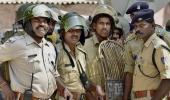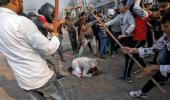The Delhi high court was informed on Thursday that a trial court has ordered 'immediate release' from jail of Jamia student Asif Iqbal Tanha and Jawaharlal Nehru University students Devangana Kalita and Natasha Narwal who were granted bail on June 15 in the north-east Delhi riots case.

"That's wonderful," said a bench of Justices Siddharth Mridul and Anup Jairam Bhambhani after noting the submissions.
It said no further orders are called for and disposed of the pleas by the three students seeking forthwith release from jail on the ground that even after 36 hours of passing of the bail orders the accused have not yet been released.
The high court was informed by the counsel for the accused that the trial court passed order earlier in the day allowing their interim release, subject to verification of documents and addresses and that the release warrants have been sent to the jail superintendent through electronic mode.
The bench, convened at 3.30 pm in pursuance to its order passed in the morning in which it asked the trial court to decide with 'promptitude' and 'expedition' the issue of release of the three accused from jail.
It had asked the counsel to jointly mention the matter before the trial court at 12 pm, which thereafter, ordered forthwith release of the accused from the jail as per the orders of the Delhi high court.
The counsel for Tanha submitted an undertaking before the trial court that he will not leave Delhi.
The high court said, "Once the trial court has issued release orders to the jail superintendent, that is the end of the matter.
"Nothing more needs to be done. The first step we need to cross today is your release."
During the hearing, senior advocate Siddharth Aggarwal, representing Tanha, submitted that the high court in its June 4 order, by which he was granted interim custody bail to appear in exams, had put a condition that at the end of the interim bail, the student shall deposit his laptop with the special cell for forensic audit.
He said he was ready to submit his laptop but this condition shall not stall his release.
Special Public Prosecutor Amit Prasad, representing Delhi Police, submitted that in view of the regular bail granted to the accused, the state does not wish to conduct forensic audit anymore.
The high court also noted that since it has already clarified in its June 15 bail order that this order supersedes the June 4 interim custody bail order, no other clarification needs to be made.
During the hearing earlier in the day, the high court said, "The trial court is expected to proceed further with promptitude and expedition and decide the issue placed before it," and added 'our order has to be implemented there cannot be two views on that'.
It said that its direction was to the effect of forthwith release of the accused and the 'trial court cannot be lax about it once the order is passed by this court'.
The accused's counsel said the police was delaying the verification process and it was a delaying tactics.
The counsel said the trial court Wednesday did not pass the order on their release saying it was already 6 pm and listed the matter for Thursday.
"The high court's orders are not being implemented in a manner by not passing an order," he contended.
The prosecutor submitted that they were not obstructing the release of the accused but they do not have the magical powers to verify the addresses of the accused from Jharkhand and Assam and other places in a short span of time.
The high court had on June 15 granted bail to Pinjra Tod activists Narwal and Kalita and Tanha, who were arrested in May last year under the stringent Unlawful Activities (Prevention) Act (UAPA) in connection with a case related to larger conspiracy in the north east Delhi riots in February last year.
The three students were not being released from the jail on time citing lack of verification details of their addresses and sureties.
As per the procedure, on being granted bail, the accused are required to furnish personal bond and surety before the trial court which issues their release warrants after verification of documents.
Communal clashes had broken out in north east Delhi on February 24 last year after violence between citizenship law supporters and protesters spiralled out of control leaving at least 53 people dead and more than 200 injured.










